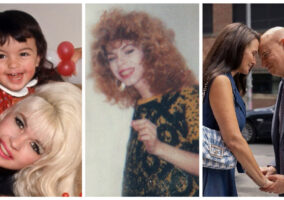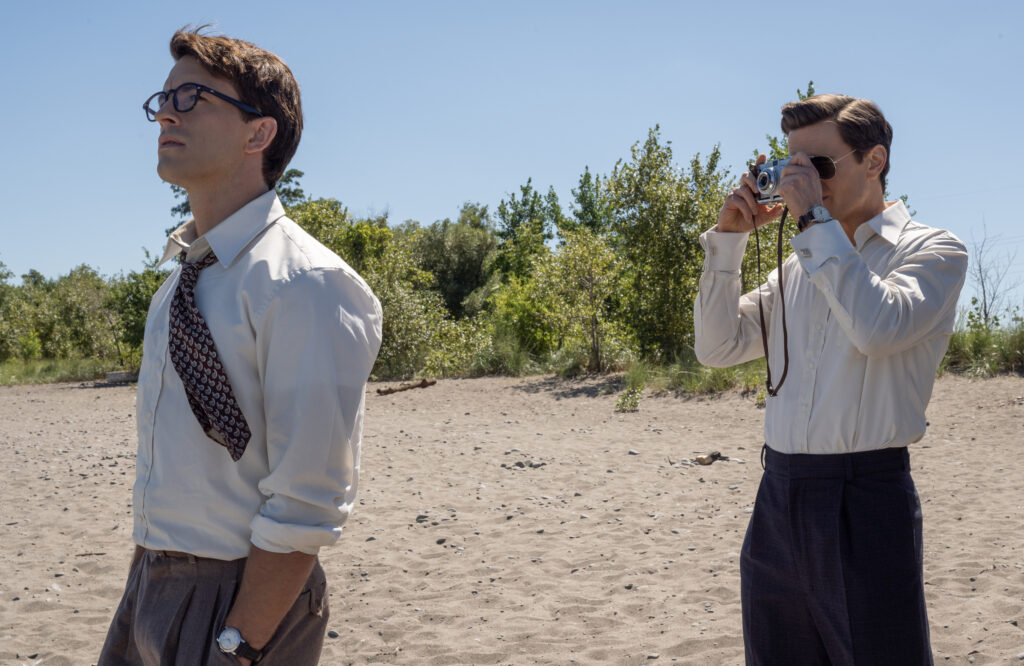
In the third episode of Fellow Travelers, Hawk teaches Tim about the realities of gay life and thirty-three years later, Tim repays the favor. It’s 1953. Tim and Hawk are on a beach, taking pictures, goofing off, acting cutely in love. Cut to 1986, Hawk is looking at the same picture in Tim’s apartment. Tim notes that his sister is exhausted and they both need a break. Hawk mention that he’s returning home tomorrow and tells him about the posting in Milan. “Congratulations,” Tim says darkly. He asks him if he even knows why he’s there. Hawk makes a feeble point about easing his conscience and Tim tells him he’d need a few centuries in Purgatory to cleanse himself of his sins. Hawk makes a joke about being Presbyterian and having to skip straight ahead to hell, which breaks the ice. Tim runs down his list of symptoms and ailments, noting that he is likely to live only a couple more months. Hawk excuses himself to the bathroom and has a full blown panic (more like guilt) attack.
In 1953, Hawk and Senator Smith are watching McCarthy rail against the commies and the queers on television while Hawk is giving him dirt to use against the conservative firebrand. Senator Smith is reluctant to go low, but Hawk reminds him that all the other side does is go low. Lucy shows up dressed for the symphony, just as Hawk is. They’re clearly well into their dating period and she’s starting to have some suspicions about the man she’s set her future on. He’s as cold as ice while she stares him down after he claims he has to leave for the weekend to take care of an old army buddy. While she’s obviously right to be suspicious and Hawk was certainly going off to be with his own kind, his well-honed ability to lie wasn’t covering up what it usually does. At the Cozy Corner, he confers with Marcus about some dirt on McCarthy and tells him he’s going to Rehoboth Beach in Delaware (long a gay getaway and still one today) to check out a lead and also have a little fun because there are “fewer eyes” on him there (which was the whole point of why gay getaways like Rehoboth, Palm Springs and Fire Island were established in the first place). Marcus informs him that he missed Tim’s birthday and Hawk reminds him that Tim was the one who left him. Nevertheless, he stops by the McCarthy hearings where Tim is literally carrying water for the Senator (it’s not subtle). Tim is still furious about having to write that fake letter about Mary and Hawk coolly notes that he and Mary are still employed, which means it worked. He and invites Tim to come spend the weekend with him in Rehoboth. As always with Hawk, it’s about control. He doesn’t give Tim much room or time to object and simply orders him to leave work and meet him around the corner.
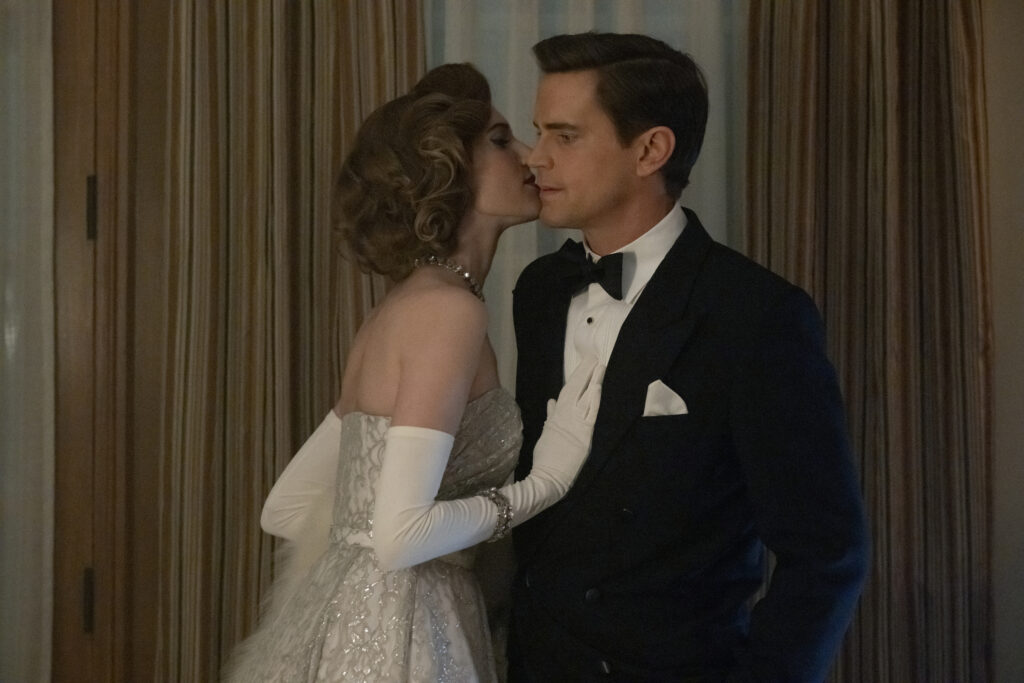
Marcus and Frankie are carrying on an affair, although Marcus is clearly hesitant about it. Frankie invites him to his newest show starring Stormé DeLarverie, playing at a straight, white club. “Those white squares love Storme” (which was true; she spent years playing the kind of drag revues that played to straight audiences). Frankie notes Marcus’ hesitation to come to the club and wonders out loud if Marcus is man enough to handle him. In Rehoboth, Hawk is educating an eager Tim on the concepts of gay getaways for largely well-to-do white men and rough trade, which are not entirely unrelated. He leaves with the bartender and tells Tim the same lie he told Lucy; that he’s going to help out an old army buddy. Instead, he’s meeting with a local hustler and former army corporal who claims to have some good old-fashioned gay dirt on Senator McCarthy.
Speaking of McCarthy, his secretary Jean is having her say about the increasingly problematic Roy Cohn and David Schine, who are bringing a distinctly gay vibe to their important work of rooting out communists. She notes that the three of them are unmarried, which is evidently a big problem if you’re hunting commies. McCarthy says that Schine won’t be a problem for much longer because someone (and it seems like it’s being implied that Jean is that someone) managed to get his status changed from 4F to 1A and he’s likely to be drafted. Roy has a complete meltdown over it and tries to throw his weight around as “a man of power and influence” with the army, but they’re not having a bit of it. Schine is apoplectic over having to serve as an enlisted man, sleep in barracks, and take orders from “the kinds of brutes you see fighting on 14th Street.” Cohn says he won’t let that happen and gets a little handsy with Schine, who appears revolted by the implication. He leaves for a date with a girl with “tits like you wouldn’t believe.”
Back at the bar in Rehoboth, Tim is waiting for Hawk to get back when a different gentleman corners him in the restroom and starts kissing him. Tim breaks away, saying he’s with someone, but you can see he’s intrigued; not so much by the man himself but by the dawning realization of his own sexual attractiveness and the power that comes with it. He goes to find Hawk and spies him in one of the motel rooms. He storms off and Hawk smoothly continues lying to him about helping an old army buddy because he can’t tell Tim that he’s looking for dirt to take down his boss. Tim explodes and when Hawk asks him what he wants, he says he wants to be with him and not have to leave before the sun comes up. “I want to eat a meal with you, like other couples,” he pleads with him, adding “Men do eat in restaurants.” Hawk takes him out to a restaurant, where he unconvincingly poses as his nephew. After Hawk reveals that his goal in life is complete personal freedom, Tim, not irrationally, assumes that means freedom from all ties or relationships and gets upset. Soon he starts drunkenly and eventually tearfully singing. It’s the cringe scene of all cringe scenes. Hawk may be a bit of a sociopath because of the way he lives his life, but the fact remains that he knows the cost of being honest about it and Tim clearly hasn’t grappled with that part of it yet. The very fact that he works for Joe McCarthy – as a true believer, no less – indicates just how confused he is about himself and what he wants. He storms out of the restaurant when he sees a straight couple kissing.
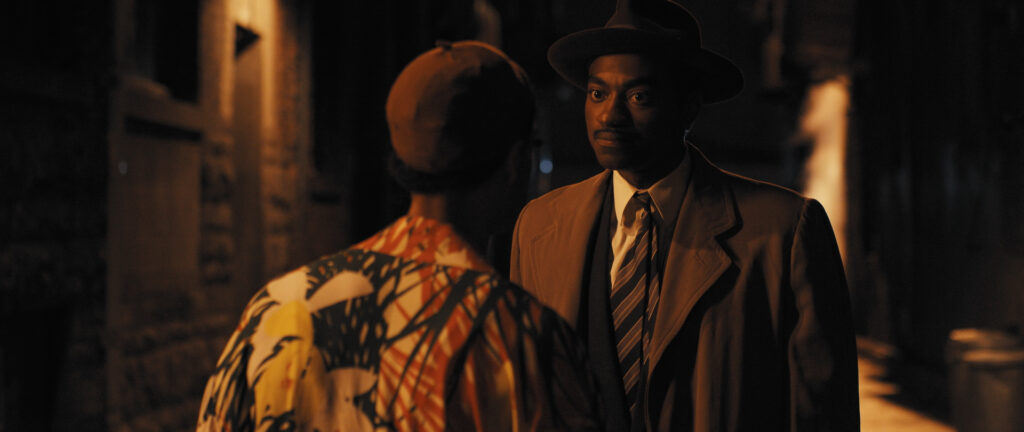
In 1986, Hawk calls home and talks to his granddaughter when he hears Tim cry out from the bathroom. He hangs up and finds him bleeding and naked on the floor. Hawk helps him up and they both realize that he’s been exposed to Tim’s blood, which prompts him to feverishly wash his hands. Tim asks him what he wants and tells him that it can’t be forgiveness because he’s too angry to have any left. He tells Hawk he needs an AIDS test. “I’m not talking about my blood. I’m talking about your life.” Tim is well aware that Hawk’s outside doesn’t match his inside and that he’s still leading a double life.
In 1953, Marcus can’t get past the host and the bouncer at the straight, white club where Frankie is performing. He argues with them and Frankie comes out to confront them, when the bouncer says they can both leave because they’re overrun with fags. Marcus goes ballistic on him for referring to Frankie as his boyfriend and they throw him out. Frankie goes after him and Marcus turns on him for making it worse by standing up for him. Marcus can’t admit that they were both called fags. “They called YOU one!” he insists. He won’t walk Frankie back to the club to get his things. Back in their hotel room, Tim apologizes for making a scene and reveals that he kissed a man in the bar. Hawk is actually a little hurt by this. These painful moments and revelations lead to the same thing it always leads to with these two: a scorching hot sex scene where they fully embody their own emotional roles as the dominant partner and the subservient one. Hawk forces Tim to say that he belongs to him over and over again. Tim, his ankles nearly behind his ears, happily gasps his assent.
Meanwhile, Roy Cohn explains to a lamp why he has a scar on his nose. It would appear the pressure is starting to get to him. We have to admit, every time the story moves away from the two queer couples at the center of it, it gets less interesting. The McCarthy office scenes are often tainted by the heavy use of prosthetics among the actors. Anyway, Cohn invites Schine back to make up with him and show him his plan for making the army pay as he gingerly holds a cigar to his mouth. Freud may have said that sometimes a cigar is just a cigar, but other times, it really is a smoking hot dick. We’re just saying.
Marcus goes back to the office, pounds on his desk and frustration, and writes up an expose of the club for breaking the law regarding integration. He takes it to Frankie the next morning and asks him to read it. Unimpressed, Frankie asks him “Where am I in this?” Marcus tells him “That’s not a fight I can have right now,” meaning he can fight segregation but he can’t do it as a gay man. He says that all people see when they look at him is a Black man, but Frankie retorts that no one ever saw him at all until he started doing drag. Ultimately, both Tim and Frankie were making requests that their partners found impossible to fulfill, but both of these instances describe a common dynamic that played out in pre-Stonewall queer life: those who can pass bumping up against the frustrations and demands of those who, for whatever reasons, can’t hide or compartmentalize their queerness. Frankie is super-femme and possibly trans, Tim is emotionally ravenous and finds it increasingly difficult to live a life of shame and dishonesty.
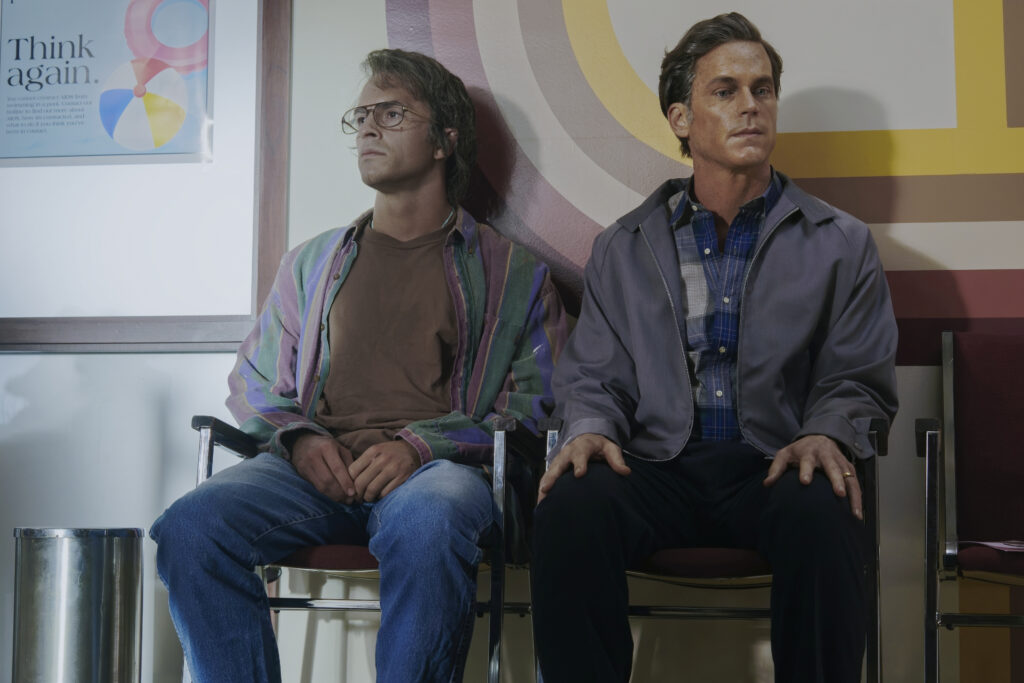
Hawk explains to a melancholy Tim that he knows all of the lying about who they sleep with hurts him, because he’s a good person, but that eventually it will become easier and easier to tell those lies because he has no other choice. Tim reminds him that they’re not lying about who they sleep with, they’re lying about who they love. It’s both a tender moment of declaration and a dark assessment of their own relationship. Thirty-three years later, the lies eventually having created an impassable gulf between them, they sit in the waiting room of an AIDS clinic, waiting for Hawk’s name to be called. Ditching his plans to fly home the next day, Hawk begs Tim to let him stay and take care of him for a little while. Tim is resistant, but it’s clearly a very weak resistance.
Hawk interviews his contact, a hard luck case who paid the price for having some dirt on McCarthy. Hawk is surprisingly gentle and nonjudgmental with him, possibly feeling some sympathy for a queer man without the kind of social and educational opportunities granted him. Class distinctions permeate this story (note how Tim jokes about being from the poor side of Hawk’s family or how much time is spent explaining Hawk’s upbringing, education, and job skills), as they tend to with a lot of stories set in the 1950s, but of course they’re all shot through a queer perspective. Look at the spaces Hawk lives and socializes in and then look at how the art direction created Frankie’s and Tim’s living spaces. In the queer community – now, but even more so then – privilege was granted to those queer people who could pass as straight or cis. It was also granted based on attractiveness and even on dick size, sexual position (note how Hawk insists he’s only a top to the nurse at the AIDS clinic) or sexual skills. Queer people like Frankie and (eventually) Tim, who are incapable of separating their queerness from the rest of their lives, are considered less privileged than queer people like Marcus or Hawk, who can pass through society and have career prospects and tickets to mainstream success (to the limited extent available to Marcus at the time). The result of a social system like this is that the most powerful queer man at that time was Roy Cohn, precisely because he hid his queerness and used his power to destroy other queer people.
The Academy Women’s Luncheon Red Carpet Rundown Next Post:
THE CROWN Star Elizabeth Debicki for La Rose Dior 2023 Ad Campaign
Please review our Community Guidelines before posting a comment. Thank you!


